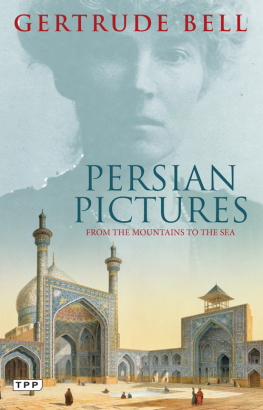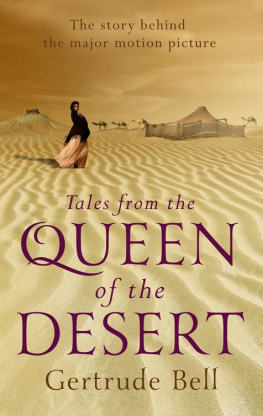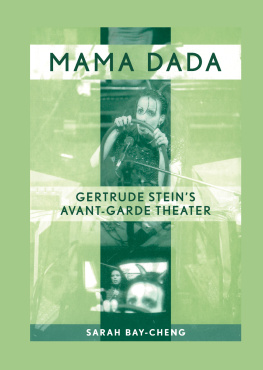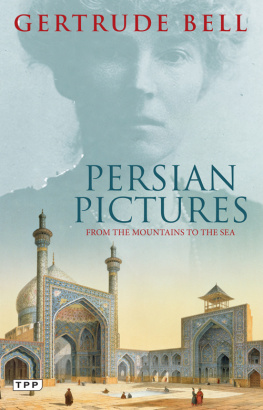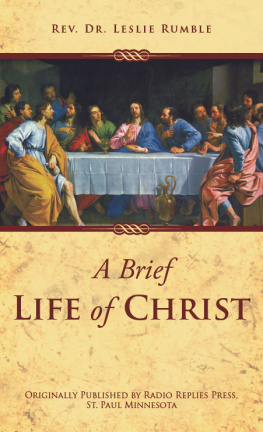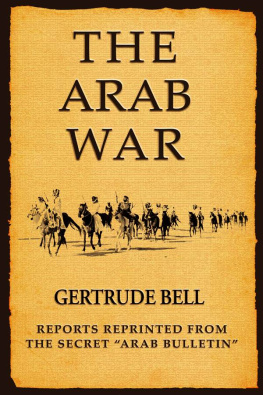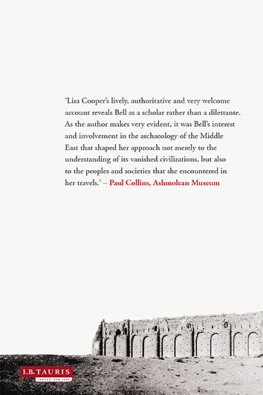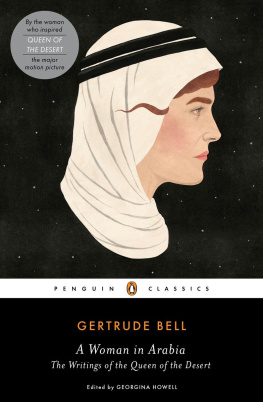Gertrude Bell (18681926) scholar, linguist, archaeologist, travellerand orientalist was a remarkable woman in male-dominatedEdwardian society. She shunned convention by eschewing marriageand family for an academic career and the extensive travelling thatwould lead to her major role in Middle Eastern diplomacy. But herprivate life was marred by the tragedy, vulnerability and frustrationthat were key to her quest both for a British-dominated MiddleEast and relief from the torture of her romantic failures. Throughher vivid writings, she brought the Arab world alive for countlesspeople as she travelled to some of the regions most inhospitableplaces.
In British diplomatic group photographs ofthe early twentieth-century Middle East,amid the plumes and uniforms and the calmparaphernalia of an empire going to hell in abucket, there is often a solitary female. Thewoman is slim, with a head of luxuriant hair,and neatly dressed in billowing muslins orin the pencil silhouette and cloche hats ofjazz-age Baghdad. The woman is GertrudeBell.
James Buchan, Guardian
Her remarkable intellectual abilities andmasculine demeanour make Persian Pictures ,her first publication on an Eastern subject, allthe more interesting.
Geoffrey Nash
Tauris Parke Paperbacks is an imprint of I.B.Tauris. It is dedicated to publishingbooks in accessible paperback editions for the serious general reader within awide range of categories, including biography, history, travel and the ancientworld. The list includes select, critically acclaimed works of top quality writing bydistinguished authors that continue to challenge, to inform and to inspire. Theseare books that possess those subtle but intrinsic elements that mark them out assomething exceptional.
The Colophon of Tauris Parke Paperbacks is a representation of the ancientEgyptian ibis, sacred to the god Thoth, who was himself often depicted in theform of this most elegant of birds. Thoth was credited in antiquity as the scribeof the ancient Egyptian gods and as the inventor of writing and was associatedwith many aspects of wisdom and learning.
PERSIAN PICTURES
From the Mountains tothe Sea
Gertrude Bell
Newpaperbackeditionpublishedin2014byTaurisParkePaperbacks
AnimprintofI.B.TaurisandCoLtd
6SalemRoad,LondonW24BU
175FifthAvenue,NewYorkNY10010
www.ibtauris.com
DistributedintheUnitedStatesandCanadaExclusivelybyPalgraveMacmillan
175FifthAvenue,NewYorkNY10010
Thetextofthiseditionwasfirstpublishedin1947byErnestBennLtd
Coverimages:ViewoftheCourtyardoftheMesdjid-i-Shah,Isfahan,fromModernMonumentsofPersia,engravedbyBachelier,1856(litho),Coste,PascalXavier(17871879)(after)/PrivateCollection/TheStapletonCollection/TheBridgemanArtLibrary.PortraitofGertrudeBell,PhotographicArchive,DepartmentofArchaeology,UniversityofNewcastleuponTyne
Allrightsreserved.Exceptforbriefquotationsinareview,thisbook,oranypartthereof,maynotbereproduced,storedinorintroducedintoaretrievalsystem,ortransmitted,inanyformorbyanymeans,electronic,mechanical,photocopying,recordingorotherwise,withoutthepriorwrittenpermissionofthepublisher.
ISBN: 9781780766928
eISBN: 9780857734976
AfullCIPrecordforthisbookisavailablefromtheBritishLibrary
AfullCIPrecordisavailablefromtheLibraryofCongress
LibraryofCongressCatalogCardNumber:available
Contents
Preface
I t is only when we have in mind the pictureof Gertrude Bell, the brilliant and tirelessadministrator, the maker of a nation, that weare able to savour to the full those qualitieswhich make her Persian Pictures so delightfulan experience. These pages take us back toher early womanhood, and reveal her to uscarefree, gay, intimate, writing in the joy ofnew discovery; they make up what she so wellcalled them, colourful little sketches of theland of miniature painting. The Persia sheknew was an unhappy country, as it seemeddoomed to perish in the grip of a degeneratetyranny; she was alert to all its patheticabsurdities and tragic weaknesses; yet she hada true vision of Persia as a land with a heroicpast, and the Persians as a kindly, hospitable,gifted people.
Gertrude Lowthian Bell, daughter of SirHugh Bell and granddaughter of Sir LowthianBell, Bt., was born at her grandfathersresidence in Durham on 14th July 1868. In1885, Gertrude went up to Lady MargaretHall, Oxford, and two years later took abrilliant First in History. In 1891, her uncle SirFrank Lascelles being appointed BritishMinister in Teheran, she began to learnPersian; and when in the following spring sheaccompanied Lady Lascelles to Persia, she hadthe great advantage of being able to speakand read the language of that country. Sherecorded her experiences and impressionsduring that visit in her diary, with no thoughtof giving them to the world; but Mr Bentley,the publisher, was anxious to have them, andher family seconded the proposal, so that sheeventually consented, with much diffidence,to publication, stipulating, however, thather name should not appear. So in 1894the sketches came out as Safar Nameh.Persian Pictures. A Book of Travel. Thebook was well received at the time, butthen forgotten; it was not reprinted until1928, when Messrs Ernest Benn publishedit with its shorter title, Persian Pictures ,and with a preface by the late Sir DenisonRoss.
The generation which received the firstedition knew Gertrude Bell as an accomplishedyoung lady of good family and brilliantintellectual gifts. The second edition cameafter the unexpectedly early close of a life ofoutstanding service not only to her country,but to humanity at large. Twenty years later,when the book is coming a third time beforethe public, Gertrude Bell is to the youngergeneration a name and a legend, best knownas the writer of charming and intimate letters.But she was infinitely more than that; for itmay be truly said of her, as can be said of feweven among the famous, that she shaped thecourse of human affairs in an important partof the world.
After her visit to Persia, Gertrude Bellnever again had commerce with that country;her Persian episode closed with the publicationin 1897 of Poems from the Divan of Hafiz , aremarkable monument to her scholarship andliterary gifts; though some twenty handshave put Hafiz into English, her renderingsremain the best. It was the Arab world thatclaimed her chief interest and whole devotionthereafter; from her first visit to Jerusalem in1899, until her death at Baghdad in 1926, shepassed the greater part of her life among theArabs.
Archology was the primary motive of herextensive travels in the Desert and the Sown;her journeys brought her a wide and detailedknowledge of Arab tribes and politics, and ledto her being summoned by David Hogarth tojoin his Arab Bureau at Cairo in 1915. Fromthat time onward she was the close associateand loved colleague of men whose names willlive in the history of the Near East, men likeLawrence, Cox, Wilson, Dobbs, Philby, Storrs.In 1916, she joined the staff of Sir Percy Coxat G.H.Q., Basrah, and accompanied him toBaghdad the following spring; she was hisOriental Secretary, and his successors as HighCommissioner for Iraq, Sir Henry Dobbs; apartfrom attending the Peace Conference at Parisin 1919, she continued at her post to the endof her days. Despite her preoccupation withpolitical affairs, she did not neglect her firstlove; in 1921, she was appointed HonoraryDirector of Antiquities, and founded theIraq Museum. She died at the height ofher fame, and in the full maturity of herpowers, on 12th July 1926; she was buried atBaghdad.

